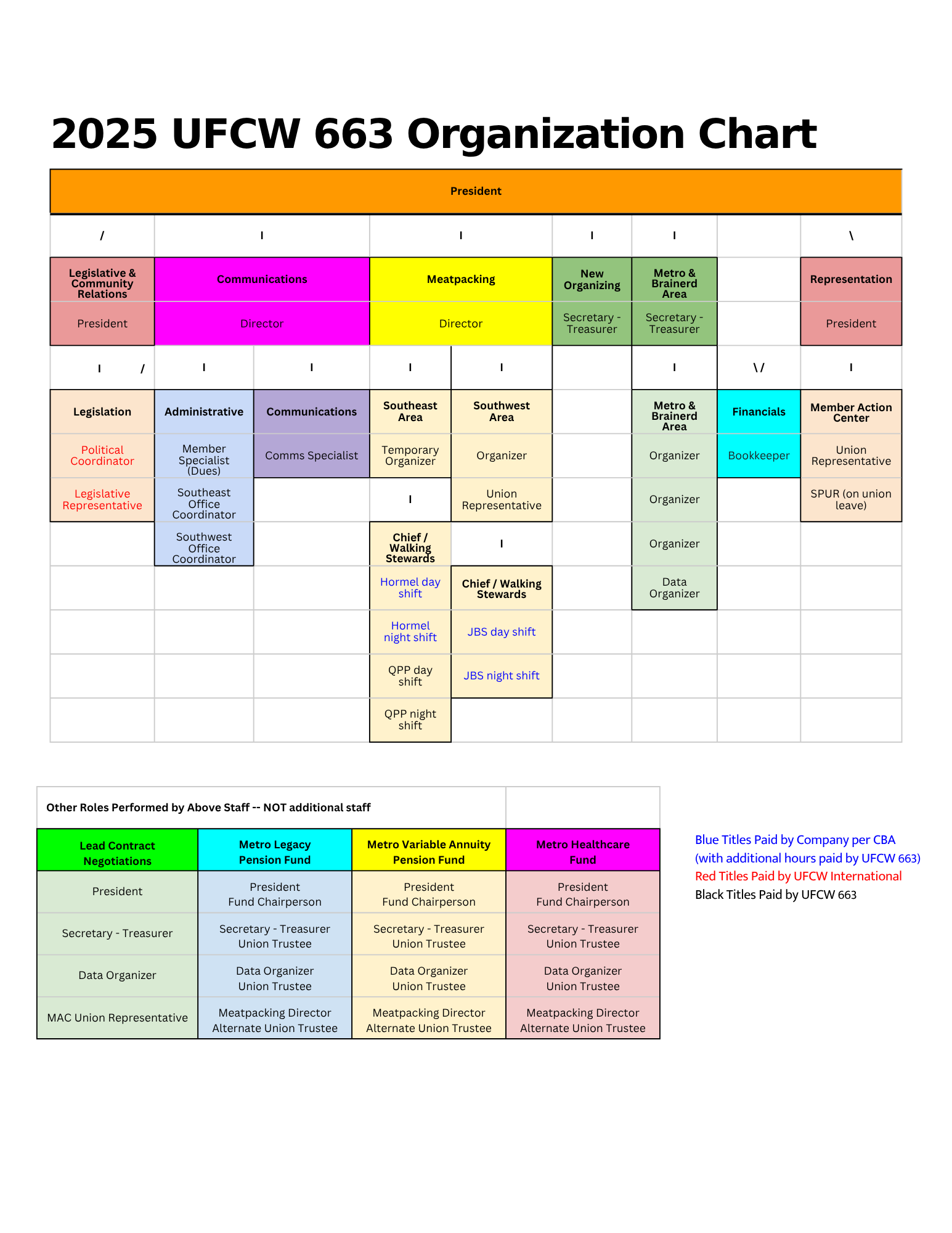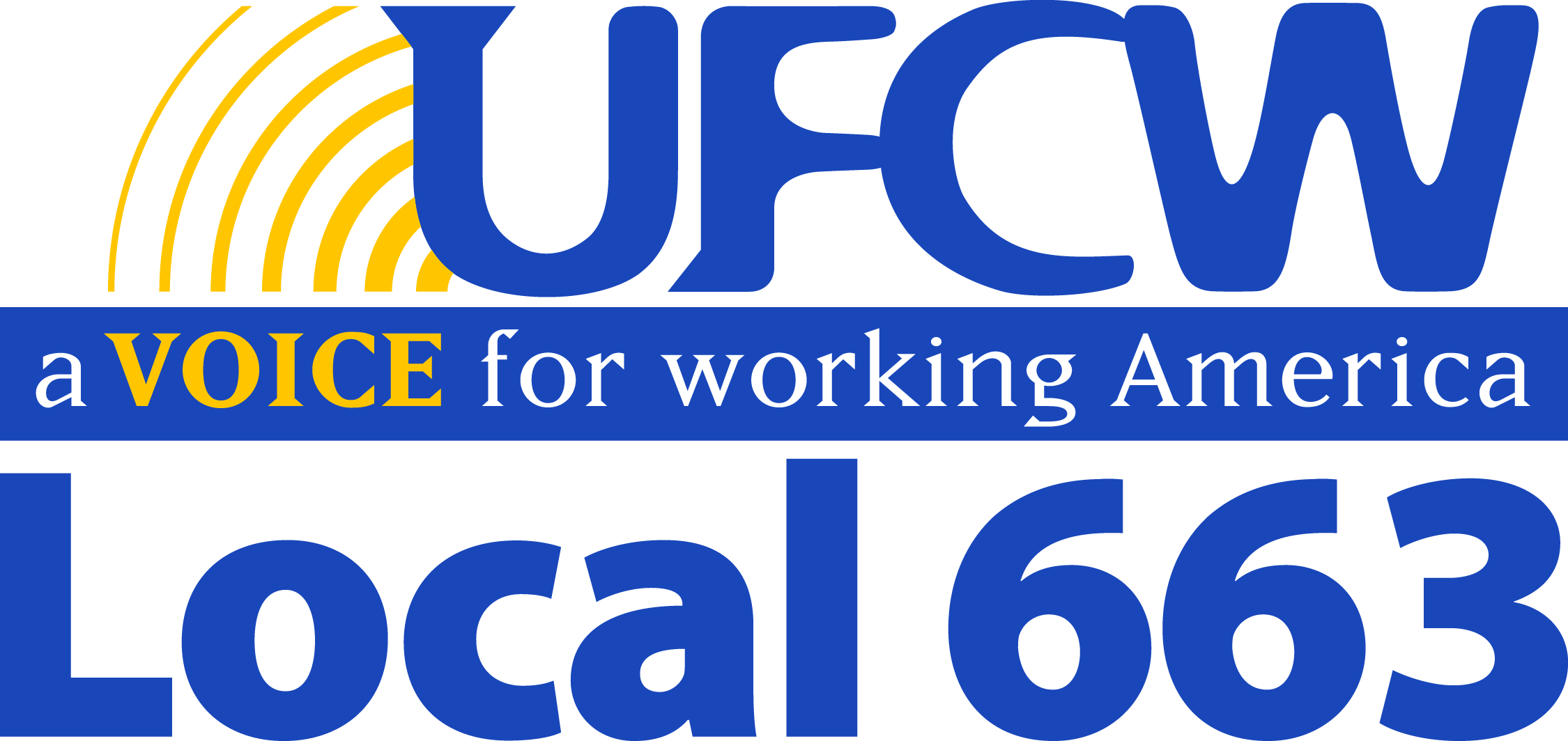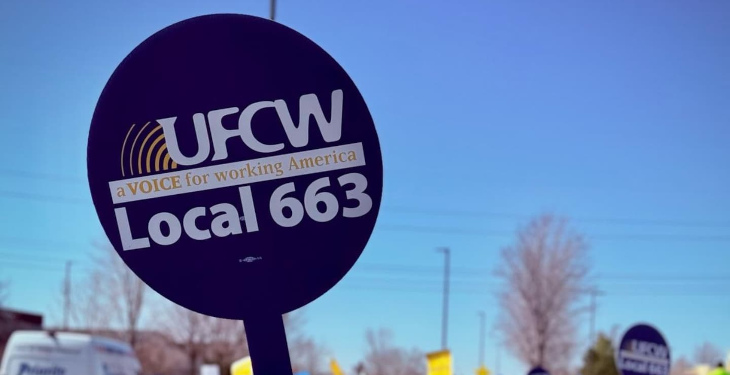Click Here to download the English version
Haga clic aquí para descargar la versión en español
Overview
We want to be clear about the financial health of our union, so we can ensure we have the resources necessary to succeed in negotiations in 2027-2028, and what we want our union to be able to achieve long term. Above is a financial report that breaks down the financial state of our Union. Here are some important takeaways:
- Expenses have exceeded revenue for decades. Through layoffs and other cost saving measures, we’ve cut everything there is to cut.
- Despite these cuts, in 2025 the Local will bring in about $6.75 million but expenses will total $7.44 million.
- For decades, the Local has relied on using our savings to make ends meet. Unless we do something, we are on pace to run out of savings within a few years.
- To prepare for the 2027–28 bargaining cycle, covering 14,000 members in grocery and meatpacking, the Local will need to close the deficit and add $2.38 million per year in staffing and $1.27 million in program costs — a strategic investment so we can enforce contracts, run member-driven campaigns, and be ready for the fights ahead.
- Download the above pdf for a full financial report.
Who We Are
Local 663 is the product of several mergers that brought together union members from across different regions and industries. In August 2018, former Locals 653 (Retail) and 1161 (Worthington) merged to form the foundation of Local 663.
This consolidation was later strengthened in November 2021, when former Local 9 (P-9) in Austin, MN, officially merged into Local 663. These mergers have expanded the Local’s geographic reach and membership base, uniting workers under one organization to increase coordination, resources, and collective bargaining power.
What We Fight For
Local 663 has become a powerhouse, member-driven union ready and willing to fight for strong contracts, grow, and advocate for our members and a better Minnesota.
In 2023 and 2025, Local 663 led major contract campaigns in retail grocery, including at UNFI Cub Foods, Lunds & Byerlys, Jerry’s, Kowalski’s, and independent grocers throughout the West Metro and Brainerd Lakes area, securing good contracts with wage increases, pension improvements, and stronger scheduling protections.
Meatpacking members at Hormel Foods and QPP in Austin, and JBS Worthington have won contracts with historic wage increases, safety reforms, and retirement security.
Our union has also won impactful legislative gains, including Frontline Worker Pay, Driver’s Licenses for All, the landmark Safe Workplaces for Meat and Poultry Processing Workers Act, and $9 million in state bonding for the Rise Up Center. Most recently, our union took legal action with a class action lawsuit against Hormel Foods, alleging violations of Minnesota’s Earned Safe and Sick Time law.
Future of Our Union
The decisions we make now will determine the kind of union we leave for those who come after us.
Our union faces two challenges: a short-term challenge in 2027 and 2028, when the collective bargaining agreements covering most of UFCW’s 14,000 members will expire, and a longer-term challenge of what our union will look like post-2028. The decisions we make now will determine the kind of union we leave for those who come after us.
In 2027-2028, we will engage in some of the most difficult and important bargaining our union has ever undertaken. Leading into those negotiations, our union will need to increase its capacity and expand our staff.
To fully fund the needs of our union, we need to close the deficit and add an additional $2.38 million for added staffing and $1.27 million for program costs, per year by 2028. These additional costs reflect a strategic investment in internal organizing, external organizing, communications, legislative work, a stewards apprenticeship program, member events, and workforce development needed to be ready for the fights ahead. This would also fund needed improvements to the historic Austin Labor Center.
Additional organizers will strengthen member outreach and support contract action teams. Union representatives will ensure that grievances over discipline and contract enforcement are handled efficiently and consistently. Legislative and communications staff help raise public awareness of key issues, build support from allies, and improve laws for working families. These roles are not permanent in every case—some are temporary or time-limited—but all are designed to ensure that our union enters 2027-2028 in a position of strength, with the tools necessary to represent members effectively and advocate for strong contracts.
Looking past 2028, we want to build a future union that is better than our union today. A union that is stronger and financially healthier. A union that has the capacity to win future fights and the power to grow our membership through organizing campaigns that raise standards for all workers in retail and meatpacking industries throughout the state.
Membership
Membership in our union has experienced a 46% decline over the past two decades
UFCW Local 663 currently represents approximately 14,000 retail, meat packing and processing, food preparation and manufacturing, healthcare, and other workers in Minnesota.
Membership in our union, which now comprises three locals (former 653,1161, and Local 9), has experienced a 46% decline over the past two decades, with retail grocery membership being just over half of what it was.
In 2000, former Local 653 represented 15,751 members, primarily in retail. By the end of 2017—just before the merger that created Local 663—membership dropped to approximately 9,600. As of 2025, the number of members from former Local 653 stands at approximately 8,100.
Meanwhile, membership in former Local 1161 (Worthington) has remained relatively stable over the past 20 years and now stands at 2,400. The same is true for the former Local 9 (Austin), which has 3,100 members as of 2025.
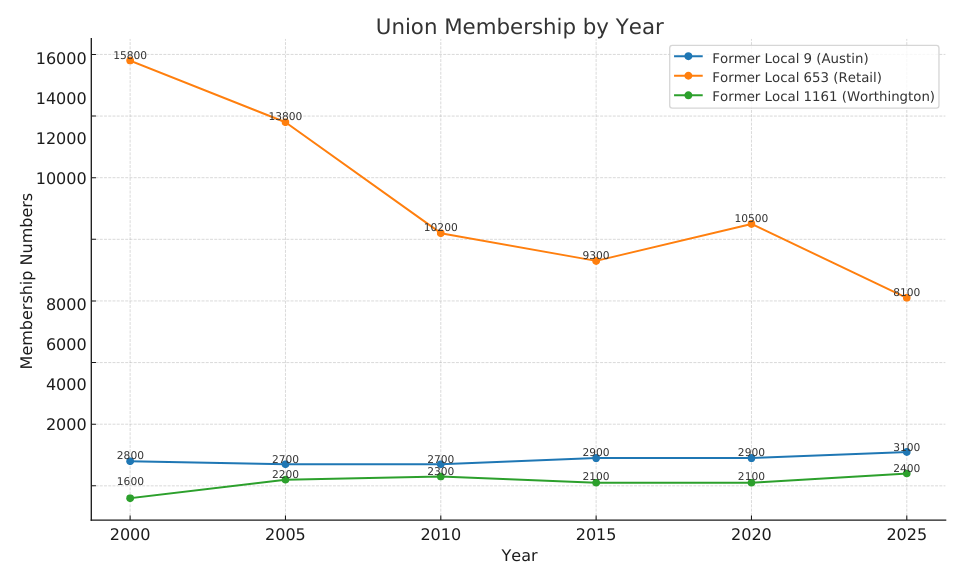
Expenses/Income*
The per capita tax now accounts for over 40% of the Local’s total expenditures
Local 663’s income is projected to slowly increase—from $6.3 in 2022 to a projected $7.2 million in 2028. Income growth, supported by rising wages, has led to increased dues in retail grocery sectors, while Southern Minnesota’s dues rates have remained unchanged.
Despite this growth, expenses have consistently exceeded revenue.
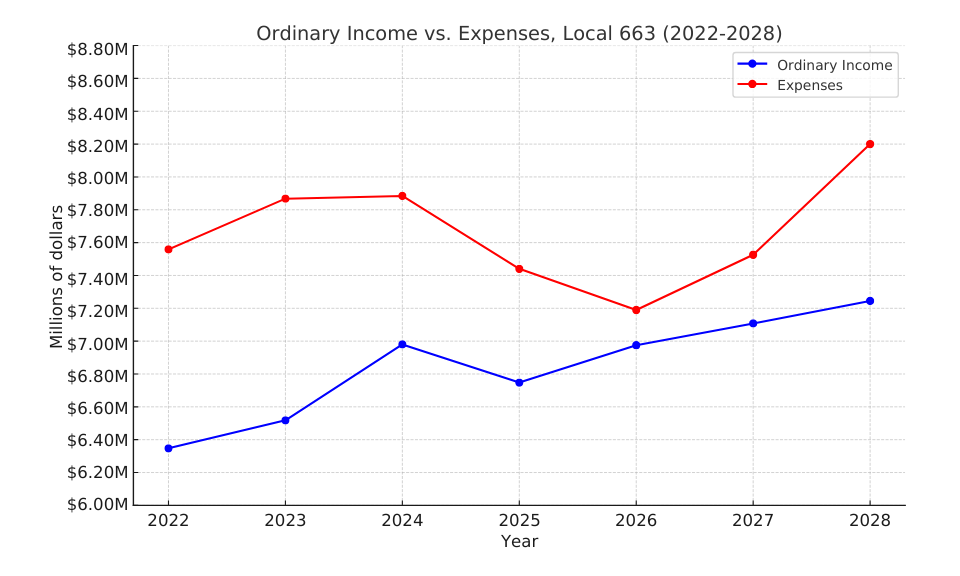
A major expense is the per capita tax, which is the amount the Local is required to pay each month, per member, to the International Union ($16.04 per member per month) and the AFL-CIO. The per capita tax now accounts for over 40% of the Local’s total expenditures, and is the single largest fixed expense. In 2025, for example, the Local is expected to bring in $6.75 million and pay $2.78 million in per capita tax.
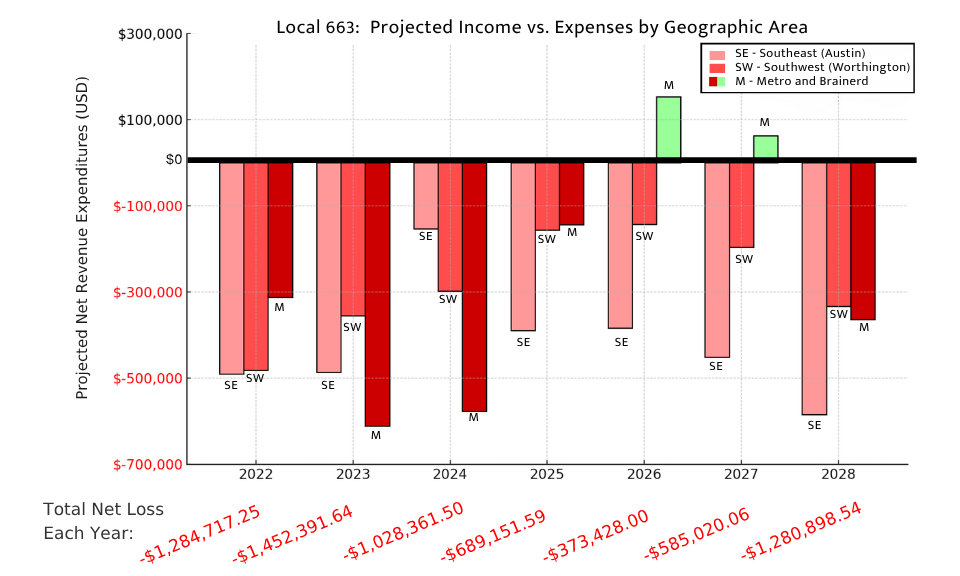
The remaining expenses include staff salaries and benefits, wage reimbursements for members, legal and professional fees, and office operations. These costs support core union work —like bargaining, organizing, and member services.
If members are interested in a more detailed breakdown of these numbers, please schedule an appointment with our bookkeeper at 763-398-1541 or rosemaryl@ufcw663.org
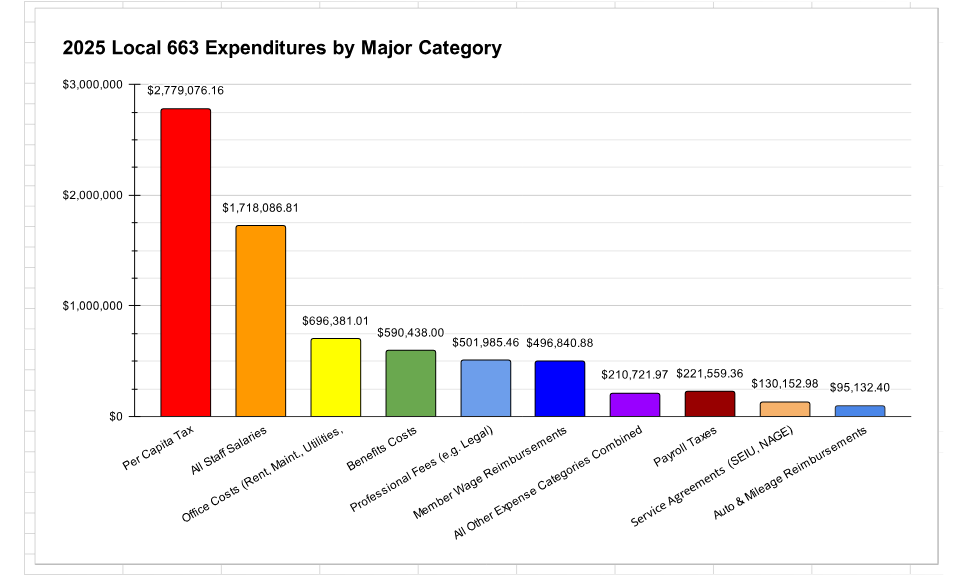
*Note that the above charts do not include additional staff or programming costs needed for ‘27 and ’28 contracts
Union Savings and Investment
Continued deficit spending without a change in income or expenses will reduce the union’s ability to respond to future challenges, and limit its capacity to invest in organizing, bargaining, and member support over the long term.
As of July, total assets are estimated at $6.1 million, with approximately $5.2 million in investments, and the remainder in cash and properties.
Over the past two decades, the union’s savings and investments have steadily declined. In 2008, the union held more than $18 million in assets. By the time the new leadership took over in 2023, nearly two-thirds of the savings had already been depleted, leaving the union with $7.3 million. The current leadership, through layoffs and other cost-cutting measures, has been able to slow the rate of decline. However, despite these cost-saving measures, investments and savings are expected to fall to under $3 million in 2029.
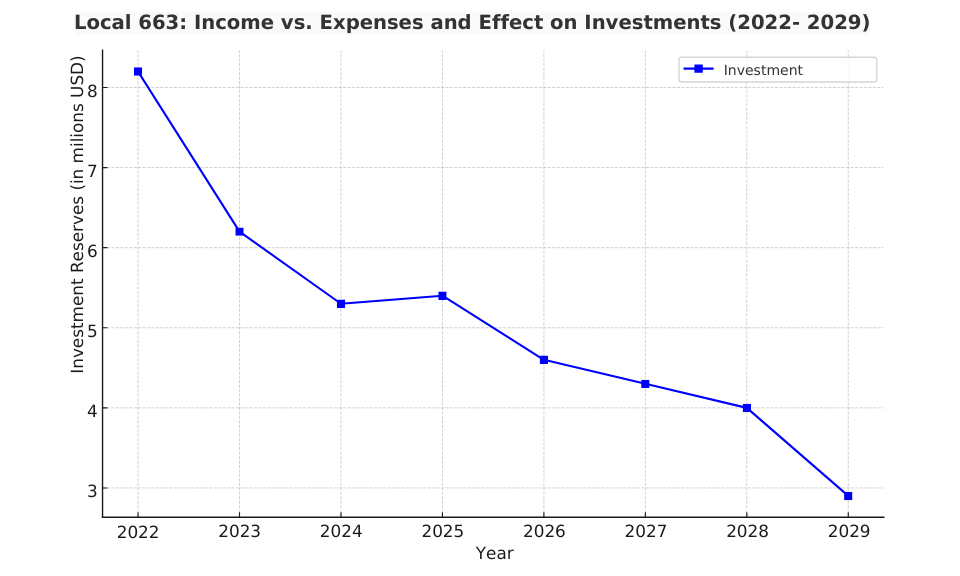
These funds have long served as a cushion against economic uncertainty and as a foundation for the union’s long-term financial security. Continued deficit spending without a change in income or expenses will reduce the union’s ability to respond to future challenges and will limit its capacity to invest in organizing, bargaining, and member support over the long term.
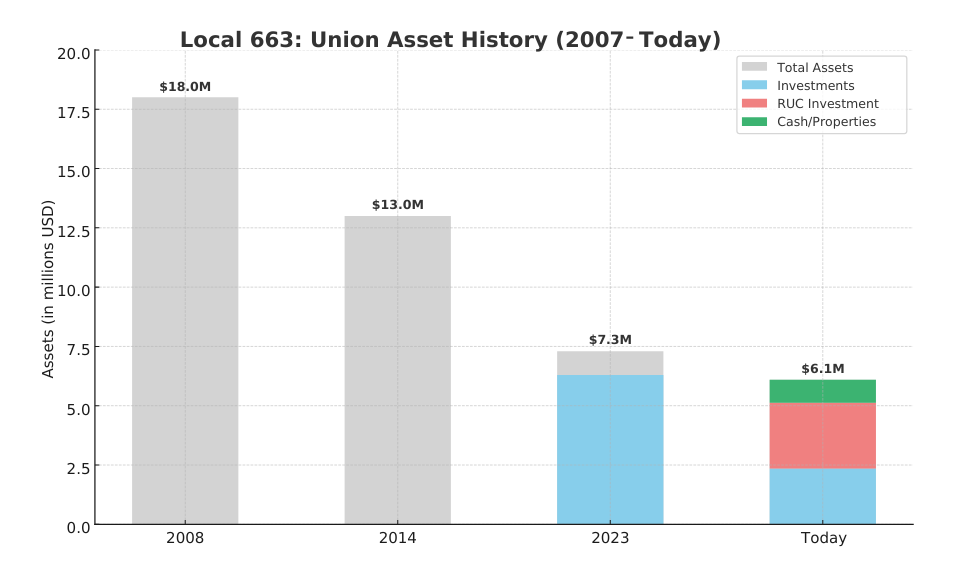
Local 663 State of the Union FAQ
What is Per Capita Tax? Why is it over 40% of our expenses?
The Per Capita Tax is the amount every UFCW Local is required to pay each month to our UFCW International Union ($16.04 per member per month) and the AFL-CIO. This is a non-negotiable expense that goes towards funding our parent union’s operations, which supports all members nationally, including: administration, organizing, legal defense, legislation, strike fund, etc.
UFCW 663’s savings and investments have been used for many years to cover regular increases in the per capita tax.
What are the staff salaries?
| Title | Annual Salary |
| President | $150,000 |
| Secretary Treasurer | $130,000 |
| Meatpacking Director | $125,000 |
| Communications Director | $100,000 |
| Field and Communications Staff | $67,000 to $100,000 |
| Administrative Staff | $62,500 to $93,000 |
Why don’t we sell OURs Resort or the Austin Labor Center?
The income generated from the one-time sales of these properties will not be enough to fund the needs of our Local. OURs will continue to rise in value and it is more financially prudent to maintain the asset as future collateral. The Austin Labor Center is an important part of UFCW and Minnesota history that is irreplaceable. Our executive board and staff spent 2 years researching and considering various options for long-term sustainability. We are now implementing plans so OURs becomes an independent revenue generator.
What is the Rise Up Center and how much is it costing the local?
The Rise Up Center will be a green, workforce development center that houses the workforce training programs, offices and 400-600 person great hall and meeting spaces for the members of UFCW 663, SEIU 26, UnidosMN, and the New Justice Project. Instead of continuing to pay rent and management fees our Brooklyn Center office that is leased and not accessible for metro members, we will be co-owners of the Rise Up Center, located across the street from a major public transit hub and attached parking ramp.
In 2024-2025 we raised $12 million from state, city and other philanthropic sources to acquire and redevelop the former YWCA in the Uptown neighborhood of Minneapolis. The $12 million raised is not from member dues. Together with our partners, we won these large investments from outside of our union. We also separately acted as the bank to finance the acquisition of the building by making a loan of $2.785 million, with repayment plus interest due to the Local within 10 years, earning 7.15% interest.
How much of my dues go towards political donations?
None. The Active Ballot Club (ABC) is a voluntary fund that members donate to, separate from dues. UFCW 663 does not use dues to make donations to candidates or political parties. The executive board reviews and approves donations from our ABC fund based on candidates’ and organizations’ track record of support for UFCW 663 members and legislation that improves the lives of working families.
Where have the savings and investments come from?
Savings and investments were historically built up over many years by members of the former UFCW 653 (this is the former Local number for retail members in the metro). These savings are invested to cushion our Union from economic uncertainty. Since 2008, the savings and investments have shrunk from more than $18 million to $6.1 million because these savings have been used to cover the increased costs of operating our union and per capita tax when dues have been insufficient.
